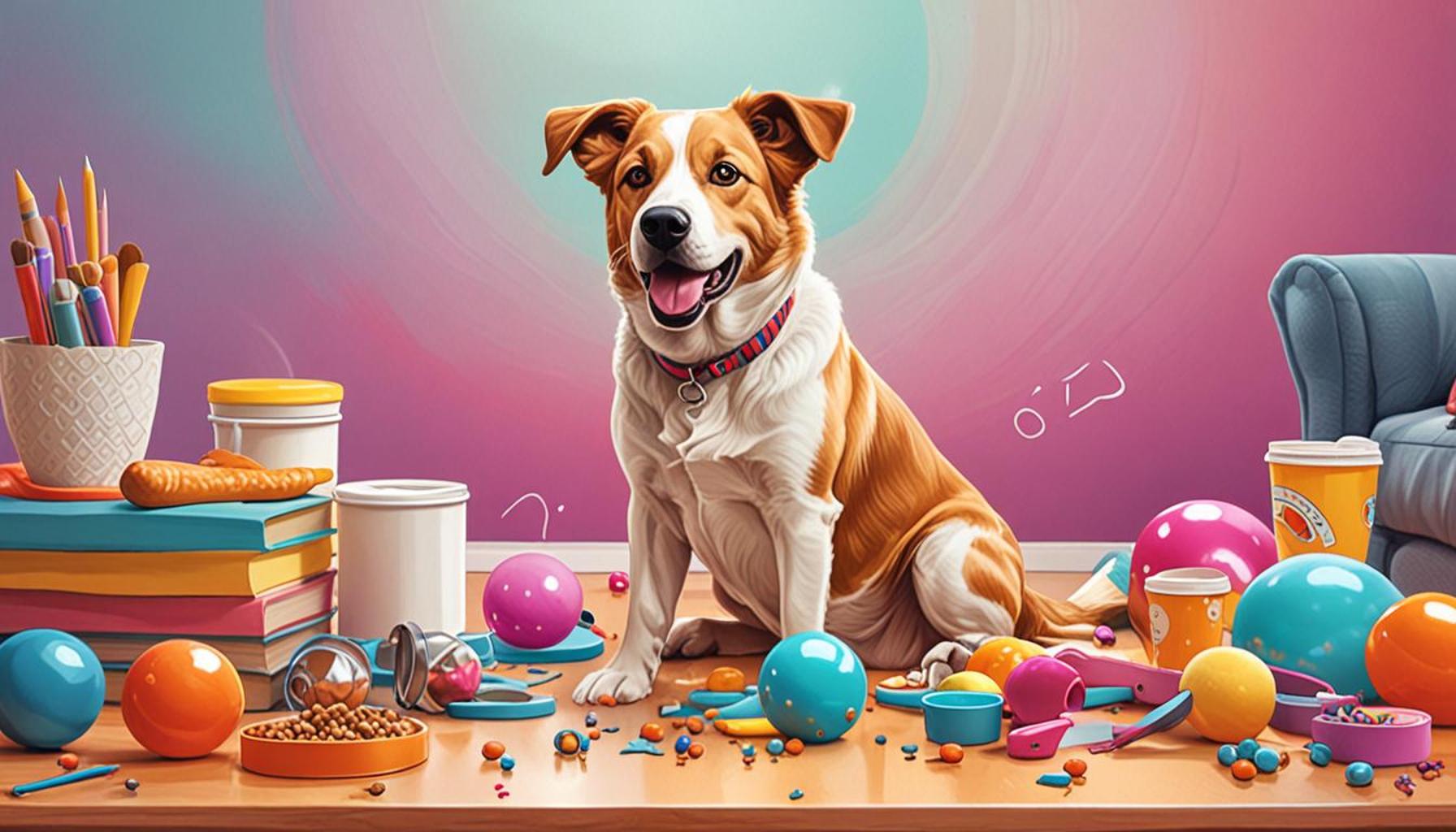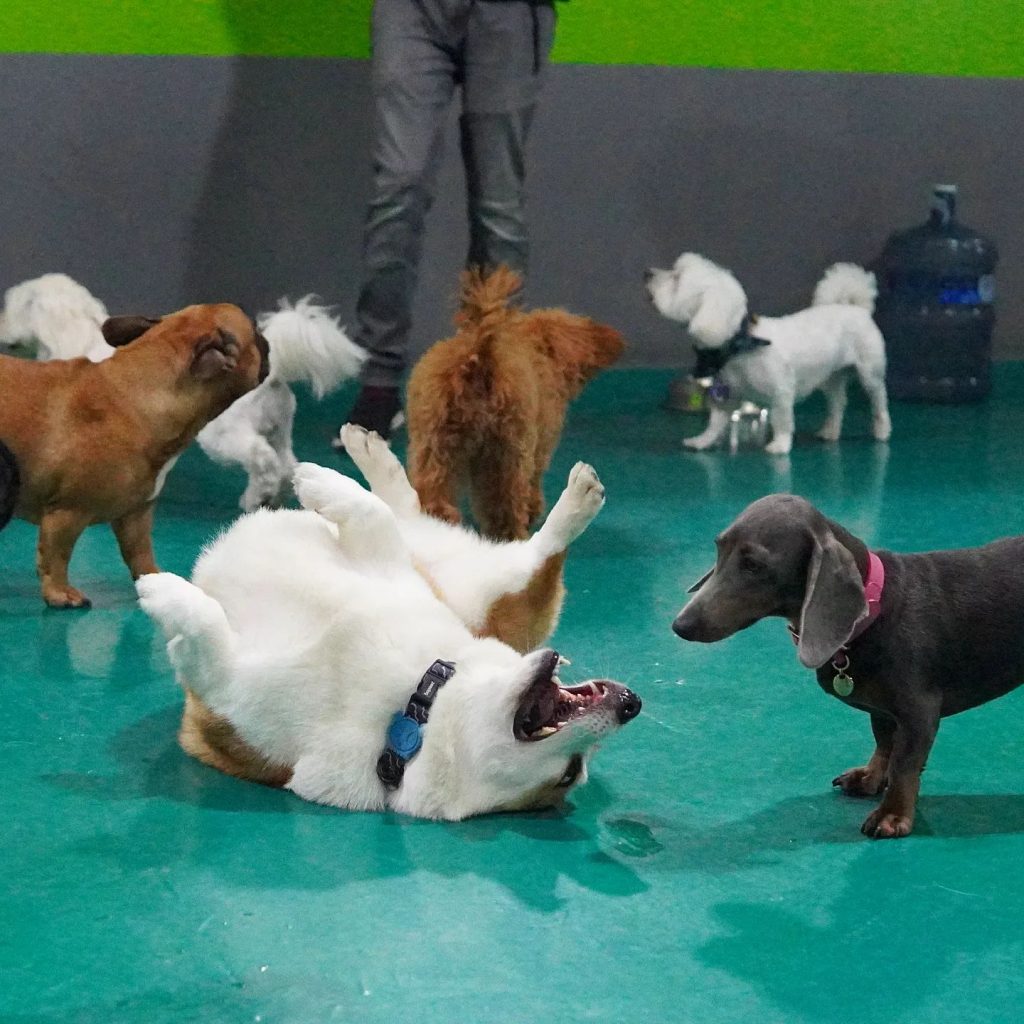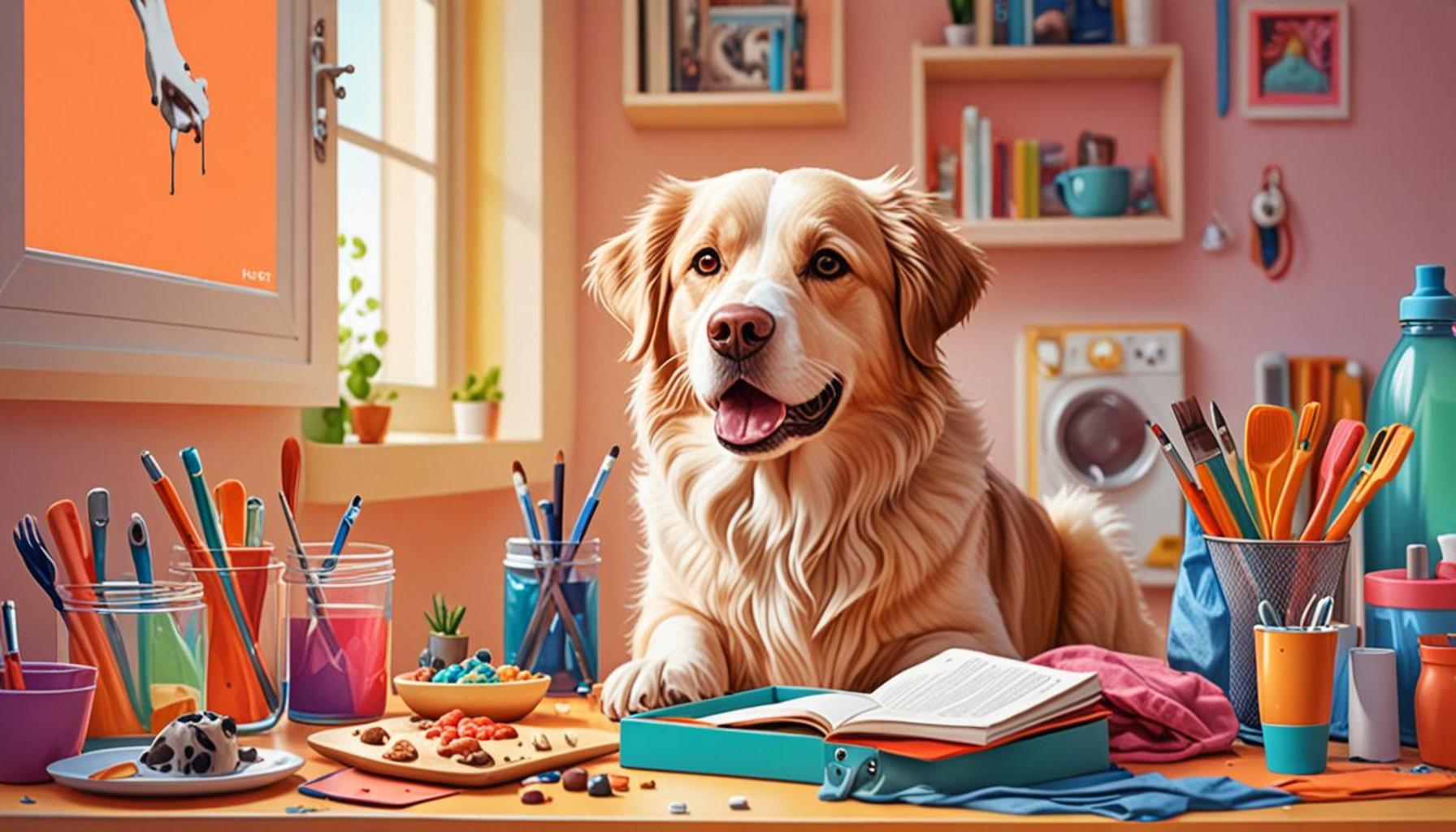How Socialization Affects Dog Behavior: Tips for a More Balanced Pet

Unpacking the Benefits of Canine Socialization
Dogs are inherently social beings, thriving on interaction and engagement with both humans and other animals. However, the nuances of their social behavior can vary significantly based on their socialization experiences. Early and ongoing exposure to different people, environments, and fellow canines plays a crucial role in forming their demeanor. A well-socialized dog is generally not only happier but also displays greater balance and confidence in diverse situations.
The effects of socialization on dog behavior are profound and multifaceted. For instance, by acclimating your dog to various stimuli—such as bustling parks, diverse grocery stores, or crowded events—you can significantly help in reducing fear and anxiety in new situations. This exposure enables your dog to learn how to respond appropriately to unfamiliar sounds, smells, and sights, thus minimizing the likelihood of fearful reactions. A classic example includes taking a pup to a farmer’s market; the lively atmosphere filled with vendors, other pets, and novel smells offers a treasure of experiences, fostering adaptability.
Moreover, socialization promotes positive interactions with other dogs and animals. Situations such as playdates with other pets, visits to dog parks, or enrolling in obedience classes can cultivate friendly behavior. For instance, engaging with diverse dog breeds helps your furry friend develop crucial communication skills, allowing them to read body language and respond accordingly. A dog that interacts confidently with others is less likely to display aggression or fear-based reactions, which can lead to smoother interactions during walks or public outings.
Furthermore, socialization encourages appropriate behavior in different environments. Just as humans adapt to a myriad of social contexts, dogs benefit similarly. Regular experiences in various settings teach them what is expected in different scenarios, such as remaining calm in a busy café or understanding the need for quiet behavior during veterinary visits. These learned behaviors can create a more harmonious life for both the pet and the owner.
It is important to recognize that many pet owners might underestimate the significance of socialization, often believing that a dog’s instinctual nature will suffice. However, the reality is more complex; factors such as age, temperament, and prior experiences can heavily influence behavior. For instance, an older dog who missed out on critical socialization periods may require more patience and tailored approaches when exposing them to new experiences.

This exploration of the connection between socialization and canine behavior highlights its essential role in nurturing a well-rounded pet. Whether you have a young puppy eager to explore the world or an older dog who needs a social boost, dedicating time to socialization can yield lifelong rewards. The investment in creating a trusting and adaptable companion ensures that every moment spent together brings joy, leading to a happier and healthier canine life.
DISCOVER MORE: Click here to learn about balanced nutrition for your pet
The Critical Window: Early Socialization for Puppies
One of the most pivotal aspects of a dog’s social development occurs during their early formative months. The critical socialization period, typically between three and fourteen weeks of age, is a window where pups are especially receptive to new experiences. During this phase, their brains are like sponges, absorbing cues about how to interact with the world around them. Engaging in various activities—such as meeting new people, encountering other dogs, and exploring different environments—helps to establish a strong foundation for their future behavior.
Research has consistently shown that puppies who are appropriately socialized in this critical window are less likely to develop behavioral issues later in life. For example, a well-socialized puppy is typically more at ease in environments they encounter later, be it a dog park or a crowded store. This leads not only to reduced anxiety but also contributes to overall emotional stability. Experts often recommend that puppy owners expose their young dogs to a broad range of stimuli to breed confidence and curtail fear.
Essential Socialization Experiences
To ensure your puppy receives adequate social exposure, consider incorporating the following essential experiences into their routine:
- Meeting Diverse People: Engage your puppy with individuals of varying ages, genders, and ethnicities. This helps them develop a comfort level with humans, reducing fear of strangers.
- Interacting with Different Dogs: Controlled playdates with dogs of various sizes and temperaments can teach your puppy vital canine social skills.
- Exploring New Environments: Take your puppy to various places, from bustling urban settings to quiet parks. This exposure will help them adapt to different sounds and sights.
- Experiencing Unique Objects: Familiarize your puppy with items such as bicycles, umbrellas, and strollers to decrease their chances of being startled by everyday objects.
- Participating in Puppy Classes: Formal classes not only provide structured learning but also offer opportunities for safe interaction with other puppies.
While early socialization is crucial, it is essential to recognize that the need for continued socialization does not end as pups grow older. Adult dogs benefit greatly from ongoing interactions, which contribute to a well-rounded and stable personality. For example, dogs welcomed into the fold of a busy family or those frequently taken to community events are more likely to remain adaptable and confident.
Understanding the importance of both early and ongoing socialization equips pet owners with the tools necessary to nurture a balanced pet. By dedicating the time to engage in positive, structured social experiences, you lay the groundwork for your canine friend to develop into a well-adjusted dog. The payoff is a rewarding companionship that is enriched by joy and stability, allowing for explorations filled with happy adventures.
Understanding the Importance of Socialization
Socialization is a crucial process to ensure your dog develops into a well-adjusted companion. It involves exposing your pet to a variety of people, environments, and other animals at a young age. This exposure plays a vital role in shaping their behavior and temperament. When dogs are appropriately socialized, they are less likely to develop behavioral issues such as aggression, anxiety, and fearfulness towards unfamiliar situations. A well-socialized dog tends to exhibit confidence and adaptability, making them not only more pleasant companions but also easier to train.
Key Strategies for Effective Socialization
The process of socialization should begin as early as possible, ideally during the critical socialization period between 3 and 14 weeks of age. Here are some tips to help you effectively socialize your dog:1. Positive Exposure: Gradually introduce your dog to different environments, sounds, and sights. Utilize positive reinforcement techniques to encourage calm behavior during new experiences.2. Group Classes: Enroll your dog in training classes where they can interact with other dogs and people. This not only helps them learn basic obedience but also exposes them to new friends in a controlled environment.3. Public Outings: Take your dog to various public places, like parks or pet-friendly stores. Observing different stimuli in these settings can promote adaptability and reduce apprehension.4. Controlled Introductions: Organize playdates with well-mannered dogs. This can educate your dog about proper play behavior, which is essential for their emotional intelligence.5. Ongoing Practice: Even after the critical period, continue to socialize your dog throughout their life. Consistency is key to maintaining a balanced and confident pet, ensuring they are always comfortable in diverse settings.By being proactive in your dog’s socialization journey, you’re setting them up for success in their interactions with the world around them. The benefits of early and ongoing socialization are profound, promoting not only your dog’s well-being but also a harmonious relationship between you, your pet, and your community.
DON’T MISS: Click here to learn about dangerous foods for your pets
Maintaining Socialization Throughout Your Dog’s Life
While the critical socialization period sets the stage for a puppy’s development, it’s crucial to understand that socialization is not a one-off event but rather a lifelong journey. Just like humans, dogs evolve and adapt, and their social needs will change over time. Therefore, continuous exposure to various stimuli and situations is necessary to mitigate behavioral issues and encourage well-rounded behavior.
Many pet owners mistakenly believe that once their dog reaches adulthood, socialization is no longer necessary, leading to potential behavioral setbacks. Adult dogs who are not regularly socialized may develop anxieties, fearfulness, or even aggressive tendencies. This is particularly true for breeds that are naturally more wary or protective. For instance, breeds like German Shepherds or Rottweilers may exhibit heightened reactions if they become isolated or have limited interaction with new people or environments.
Strategies for Ongoing Socialization
To ensure that your dog continues to thrive socially, consider implementing these effective strategies:
- Regular Playdates: Maintain relationships with other dogs through consistent playdates. This fosters both physical and mental stimulation and allows your dog to learn from their peers.
- Exploring New Activities: Engage your dog in pet-friendly events, such as community dog shows or pet expos. These gatherings expose them to a variety of stimuli while creating enriching experiences.
- Daily Walks in Different Areas: Vary your walking routes to introduce your dog to new sights, sounds, and scents. Visiting different parks or neighborhoods can stimulate their curiosity and adaptability.
- Training Classes: Enroll your adult dog in obedience classes, agility training, or even diversion classes. These provide not only mental challenges but also the opportunity to interact with other dogs and handlers.
- Inviting Friends Over: Host gatherings that include pet-friendly friends and their dogs. This effectively expands your dog’s social network while reassuring them about welcoming new people into their space.
Additionally, it’s important to pay attention to your dog during these socialization activities. Dogs communicate in subtle ways; observing cues like tail position, body language, and vocalizations can reveal how comfortable they feel in different scenarios. If a situation proves overwhelming, it’s wise to remove them and gradually reintroduce them to the experience.
Moreover, owner involvement plays a significant role in a dog’s social behavior. A relaxed and confident owner will likely translate these traits to their pet. Therefore, practicing patience, using positive reinforcement when your dog behaves well in social situations, and fostering a calm demeanor are vital for shaping a balanced pet.
Lastly, socialization isn’t just about interactions with other dogs and people; it’s also about mundane experiences like car rides and visits to the veterinarian. Regularly exposing your dog to these situations can significantly help reduce anxiety and foster a sense of trust in their owners and the world around them. By making socialization an integral part of your dog’s life, you can ensure a brighter future filled with possibilities—promoting not just a happy dog, but also a harmonious household.
DIVE DEEPER: Click here to learn more
Conclusion
In conclusion, understanding the profound impact of socialization on dog behavior is essential for every pet owner aiming to cultivate a balanced and well-adjusted companion. The journey of socialization does not end when your pup reaches adulthood; it is a continuous process that significantly influences their emotional and psychological well-being. By remaining committed to ongoing socialization practices, like scheduled playdates, varied walking routes, and engaging training classes, owners create an environment where their dogs can thrive, feel secure, and interact positively with the world around them.
Research indicates that dogs who experience regular social interactions tend to exhibit fewer behavioral issues, such as anxiety and aggression. Moreover, your responsiveness to their cues signals safety and comfort, contributing to their development into a confident pet. It’s also vital to recognize that fear and anxiety can stem from lack of exposure, making it imperative for owners to proactively introduce their companions to various stimuli, whether it’s new people, sounds, or situations.
Ultimately, socialization fosters a deeper bond between you and your furry friend, creating a harmonious living environment. This nurturing relationship not only enhances your dog’s quality of life but also enriches the lives of everyone around them. By prioritizing socialization and employing effective strategies, you stand to raise a well-rounded dog, ready to embrace all of life’s adventures with confidence and joy. For those curious to explore more about dog behavior and socialization techniques, numerous resources and communities are available to support you on this fulfilling journey.



